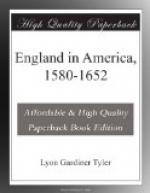These proceedings practically vested all the judicial and legislative powers in the court of assistants, whose tenure was permanent, and left to the freemen in the general court little else than the power of admitting freemen. Not only was citizenship based on church-membership, but the Bible was the only law-book recognized by the court of assistants. Of this book the ministers were naturally thought the best interpreters, and it thus became the custom for the magistrates to consult them on all questions of importance. Offenders were not merely law-breakers, but sinners, and their offences ranged from such as wore long hair to such as dealt in witchcraft and sorcery.
Fortunately, this system did not long continue without some modification. In February, 1632, the court of assistants assessed a tax upon the towns for the erection of a fortification at Newtown, subsequently Cambridge. The inhabitants of Watertown grumbled about paying their proportion of this tax, and at the third general court, May 9, 1632, it was ordered that hereafter the governor and assistants in laying taxes should be guided by the advice of a board composed of two delegates from every town; and that the governor and other magistrates should be elected by the whole body of the freemen assembled as the charter required.
Two years later a general court consisting of the governor, assistants, and two “committees,” or delegates, elected by the freemen resident in each town, assembled and assumed the powers of legislation.[13] This change, which brought about a popular representative body—second in point of time only to Virginia—was a natural extension of the proceedings of 1632. In 1644 the assistants and delegates quarrelled over an appeal in a lawsuit, and as a result the division of the court into two co-ordinate branches occurred.[14]
Nevertheless, the authority of the court of assistants, for several reasons, continued to be very great. In the first place, unlike the Council of Virginia, which could only amend or reject the action of the lower house, the assistants had the right of originating laws. Then the custom at the annual elections of first putting the names of the incumbents to the vote made the tenure of its members a pretty constant affair. Next, as a court, it exercised for years a vast amount of discretionary power. Not till 1641 was the first code, called the Body of Liberties, adopted, and this code itself permitted the assistants to supply any defect in the law by the “word of God,” a phrase which to the followers of Calvin had especial reference to the fierce legislation of the Old Testament.




